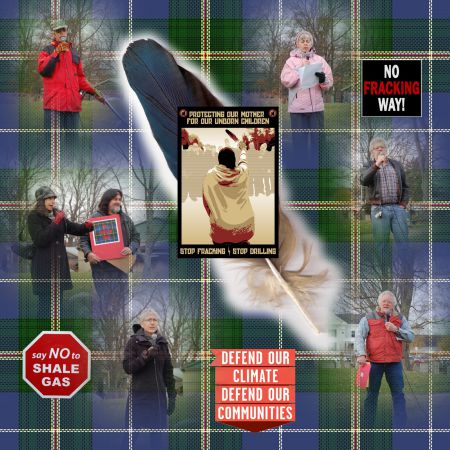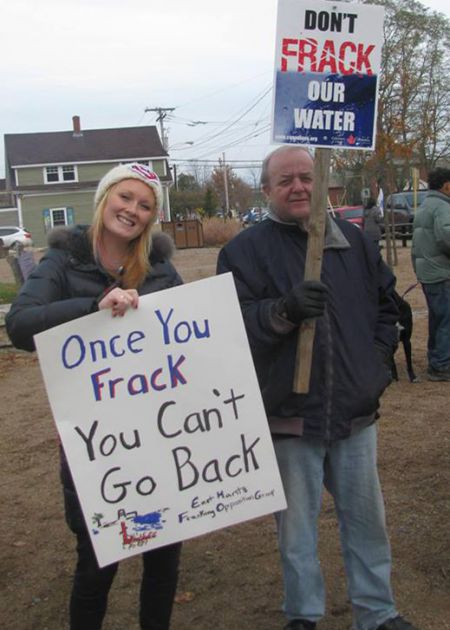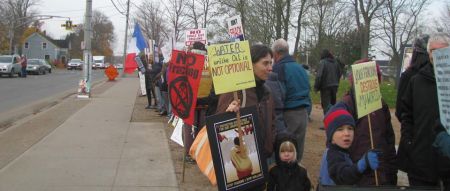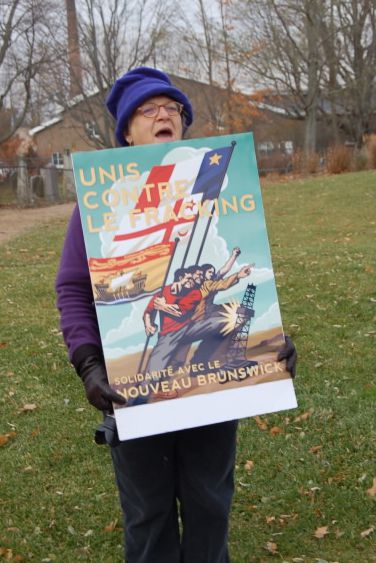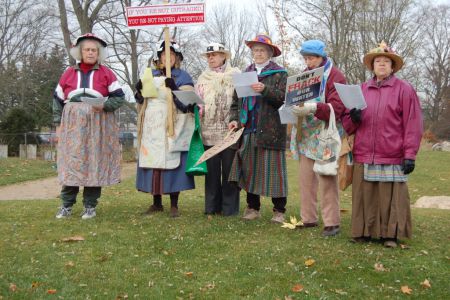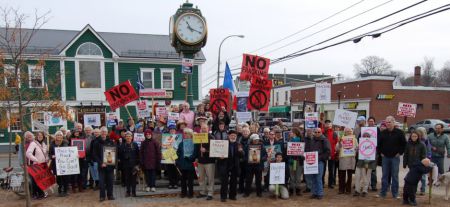NoFrac Wolfville held a Celebrate Our Environment event on November 16th.
In doing so the rural Nova Scotia town joined 130 other communities across Canada in the national “Defend Our Climate, Defend our Communities” day of action, evidence of a growing opposition to the risks posed to our climate and communities by unchecked resource extraction.
NoFrac Wolfville held one of five rallies taking place in the province, calling for a ban on hydraulic fracturing, or "fracking" as it is now known.
The action comes as federal and provincial governments are pushing for pipelines across the country and into the United States as well as increased tar sands & shale gas development. Local volunteers organized the event with national support and facilitation by Leadnow.ca and dozens of environmental, Indigenous and community groups.
“Support will be expressed for the struggle in Elsipogtog and Rexton, N.B.”, said Marke Slipp, one of the organizers prior to the event, “but the focus is to celebrate our great community; our land, our water. Of course, from this, the most immediate local issue or threat is hydraulic fracturing. It will also impact our grandchildren.”
Extensive Fracking has been proposed for the so-called Windsor Block, there are plans for 680 wells from Truro to Wolfville. The provincial moratorium on fracking is scheduled to end in April 2014 although a regulatory review is just getting underway, headed by Cape Breton University’s President and Vice-Chancellor, Dr. David Wheeler.
The Raging Grannies got the rally presentations underway with a lively song about Fracking sung to the melody of I’se The B’ye. The first to speak to the 80 or so people assembled on the brisk but sunny morning was former Green Party candidate, Anna-Maria Galante.
“The problem with fracking is that risk to those resources that would perpetually sustain us – if we let them – far, far outweighs whatever temporary economic gain might result, with absolutely no guarantee that it would trickle down to the people who need it most,” said Galante, "So if we are ever to emerge from the energy dark ages, we have to step into an era of self-determination, with small-scale power generation,” she added.
About a dozen people spoke at the rally, addressing topics ranging from sustainable communities and energy alternatives to the bio-solids that result from fracking wastewater treatment, community oriented energy development and support for the First Nations people throughout the Maritimes in their struggle to be heard.
“We are all Treaty people, as descendants of First Nations and Settlers, and as new settlers in this region.” declared Mary Lou Harley, a member of the Wabanaki Confederacy Alliance. “We have the responsibility to uphold the Peace and Friendship Treaties.”
Harley, also a member of the the Aboriginal Rights Coalition, and president of the Green Party of Nova Scotia, continued, “We are gathered to hold authorities and corporations responsible for their actions. We hereby alert our new provincial government that we expect them to accept their responsibility to prevent environmental damage and one step to do so is a legislated ban on gas production by hydraulic fracturing.”
The day of action comes as a recent poll designed by the University of Montreal shows an overwhelming majority of Canadians want the federal government to take stronger action on climate change.
A recent poll in Nova Scotia notes that 69% of Nova Scotians would support extending the moratorium on fracking in the province.
At their annual meeting this month, the Union of Nova Scotia Municipalities supported a proposal by the District West Hants to extended the moratorium on fracking and were supportive of more dialogue with the First Nations communities about resource extraction. They also want the province to clearly outline policies and procedures around dealing with the contaminated wastewater that results from hydraulic fracturing.
“Today, we saw communities opposed to reckless oil pipeline expansion in the West uniting with communities in the east and the north to defend our climate and communities,” said Maggie Knight of Leadnow.ca. “We are seeing the growing impacts of more extreme weather across the world, and the people who stood up today want Canada to be part of the solution.”
~~~~~~~~~~~~~~~~~~~~~~~~~~~~~~~~~~~~~~~
Click here for more information on the Defend our Climate, Defend our Communities Day of Action.
Photo Credits: Al Smith, Joceylene Marchand, Kathleen Donovan

